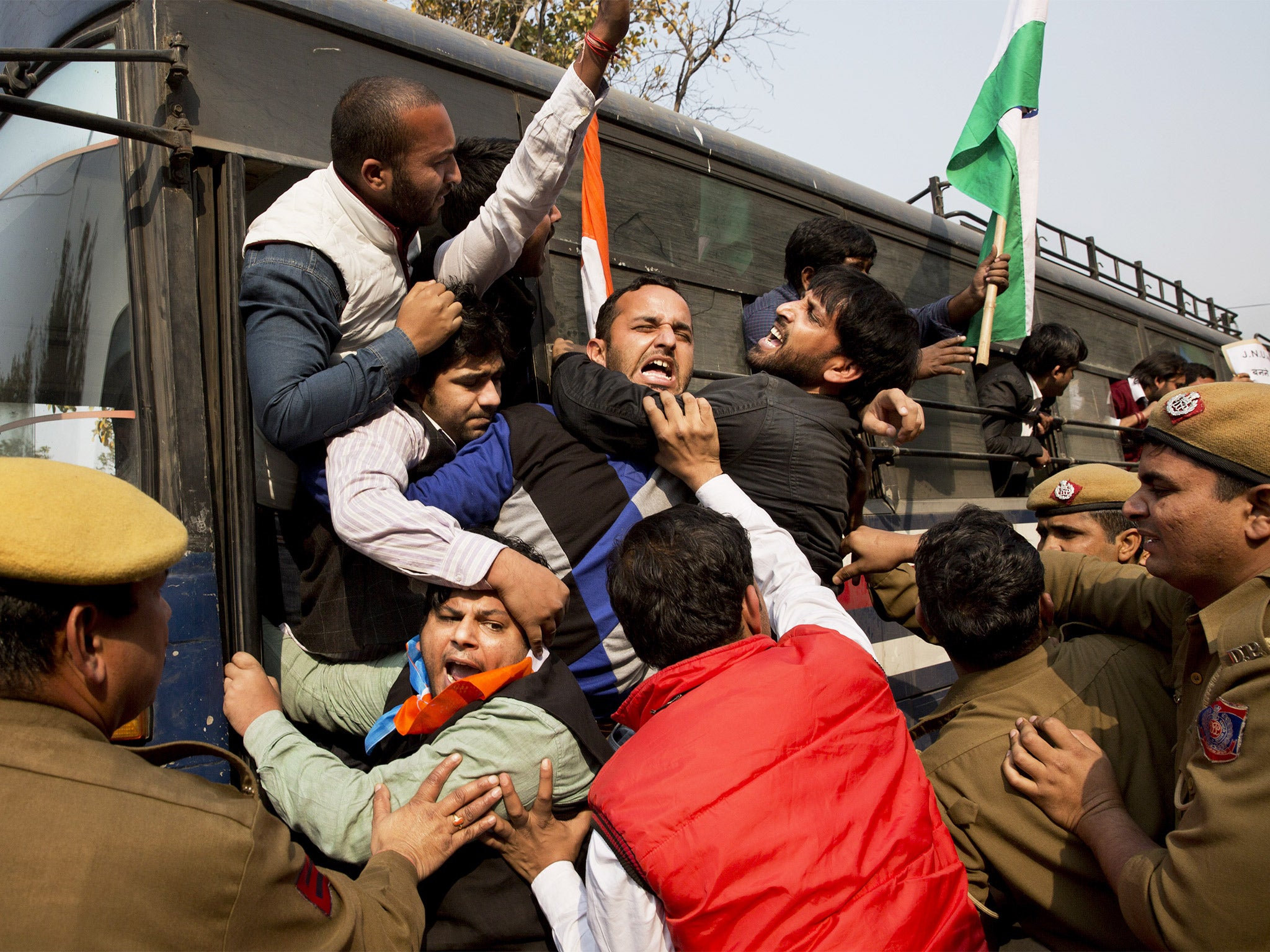Indian student union activist attacked by ‘man dressed as lawyer’ while appearing in court on sedition charge
The case has triggered the biggest nationwide protests by students in 25 years and a tough response from supporters of the Hindu nationalist government who many accuse of curtailing free speech

Fighting broke out at an Indian court that was hearing a case against a left-wing student leader accused of sedition, a charge that has sparked protests across university campuses and criticism that the Hindu nationalist government is curtailing free speech.
Kanhaiya Kumar, head of the student union at Delhi’s prestigiious Jawaharlal Nehru University (JNU), was rushed from a car through a gate into the court by police officers protecting him with a riot shield. He was later remanded in custody by the court until 2 March. Lawyers chanting nationalist slogans earlier barged into the compound and threw stones, defying a Supreme Court order banning protests after a punch-up at a hearing on Monday.
Wednesday’s remand hearing was briefly adjourned as the Supreme Court rushed a team of commissioners to investigate after lawyers for Mr Kumar said he had been attacked inside the Patiala House court in New Delhi. “A person has come dressed as a lawyer and beaten him up inside the court premises today,” Vrinda Grover, a defence lawyer, said. “The police couldn’t do anything, it’s a complete violation of the Supreme Court order.”
Mr Kumar told the court he was manhandled on the way in and lost his shoes in the process. “I was rebuked, I was attacked,” he said. The 28-year-old was arrested at a student rally last week held to commemorate the anniversary of the execution of a Kashmiri separatist for his role in an attack on the Indian parliament in 2001.
Supporters of Mr Kumar, a member of the leftist All India Students’ Federation (AISF), which has a Soviet hammer and sickle as its logo, denied that he made incendiary remarks.
A video of a speech given by Mr Kumar during the event has been widely reposted on Indian media. In it, he criticises a right-wing student fraternity and the Rashtriya Swayamsevak Sangh, a Hindu-nationalist umbrella group to which Prime Minister Narendra Modi’s ruling party belongs. He also explicitly eschews violence.
The case has triggered the biggest nationwide protests by students in 25 years and a tough response from supporters of the nationalist government who say the actions against Mr Kumar are justified.
In a climate of growing polarisation, Mr Modi’s Bharatiya Janata Party (BJP) is increasaing Hindu-nationalist rhetoric ahead of an election in India’s most populous state, Uttar Pradesh, next year. The opposition Congress party and Communist leaders have rallied behind Mr Kumar and his AISF in its stand-off with the pro-BJP student union, the Akhil Bharatiya Vidyarthi Parishad (ABVP).
As protests have escalated, the chief of Delhi police faces accusations of taking political orders and failing to investigate alleged violence by nationalists loyal to Mr Modi. In one case, a BJP politician attacked a Communist politician on the street outside the courthouse on Monday in an incident caught on television. “If I had committed a crime then my party would have thrown me out,” Om Prakash Sharma said. “I am ready to face any kind of punishment to defend my core philosophy.”
Some commentators and legal experts fault the government for exploiting the colonial-era sedition law to silence its opponents, when it should instead have left university rectors to manage what they say is no more than exuberant student debate. “Any critical comment against government policy does not amount to sedition,” Soli Sorabjee, a former Attorney General of India, said. “Only acts that can disturb law and order or incite violence can be stamped as sedition.”
Mr Modi’s party rejected the criticism. “The constitution is clear that freedom of speech does not extend to the right to promote secession; slogans that demand the disintegration of India cannot be condoned,” said a BJP spokesman.
Mr Kumar’s mother denied accusations of disloyalty. “My son spoke the truth. He was arrested because his views questioned the government policy and their agenda,” Meena Devi said from her home in Bihar.
Reuters
Subscribe to Independent Premium to bookmark this article
Want to bookmark your favourite articles and stories to read or reference later? Start your Independent Premium subscription today.

Join our commenting forum
Join thought-provoking conversations, follow other Independent readers and see their replies